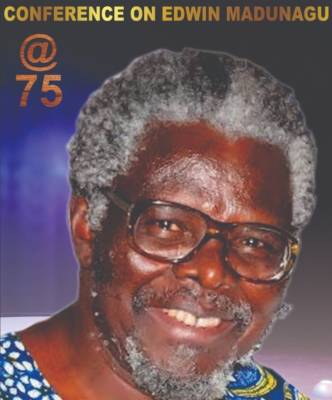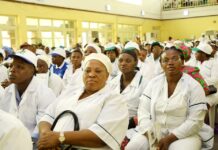BY BIODUN OLAMOSU

Edwin Madunagu’s life story is an exemplification of the multiculturalism that a pluralistic society like Nigeria represents. Possibly this is responsible for the metropolitan socialist world outlook that he adopted from early in his life.
Edwin Madunagu, an Igbo by descent, was born in the Okitipupa area of present Ondo State. He was educated at Ilesa Grammar School and then the University of Ibadan. During his professional career he worked in Oyo (Olivet), Lagos and Calabar (University) where he taught mathematics. He settled in Calabar that served as his home for most of his life.
His politics started as a student at the University of Ibadan where he studied mathematics. A tradition of Marxist scholarship was already prominent at the University in the 1970s before Madunagu gained admission. He, his wife, Bene and Eskor Toyo later also made Marxism popular at the University of Calabar. They established the radical left organisation, the Frantz Fanon Study Group. This helped to produce activists for the next generations from among students, lecturers and the working people in general.
As a Marxist, praxis was as important as theory, in equal measure. So he was never at any point in time behind in matching his involvement in popular struggles with his writing and theoretical works.
He joined the Guardian newspaper as a columnist and became a prominent member of its editorial board. Not a few people followed him for many years through his writings that were published every Thursday in Guardian. No doubt the paper from inception had contributors with leftist and literary background. The Guardian therefore became a medium of robust debates on politics, economy, education, arts and literature. The paper became the toast of intellectuals and could be compared favourably well with the Daily Times some years earlier. Contributions from Edwin Madunagu were unique as he centred his discussion on socialist politics and this defined Madunagu as a writer.
Trotskyist politics were an aberration in the 1980s. But Madunagu lent his voice and support and boosted the morale of the extant Trotskyist youth organised around Labour Militant. This was defined in opposition to the Stalinist school of thought who supported ‘real existing socialism’ in the USSR (now Russia). This was a time when his contemporaries on the left were still enjoying their cordial relationship with successive Stalinist governments in the then USSR and Eastern European countries.
Shortly thereafter the counter-revolutionary nature of Stalinist Russia and its allies in Eastern Europe became exposed. The collapse of Stalinism in 1989 was just a formality or sideways move. Real socialism, as workers power, had ceased to define the ideology of the USSR as far back as the late 1920s. This was a period of struggle and repression after the demise of V. I. Lenin. Most of the leaders of the Bolshevik party were killed. Leon Trotsky was forced into exile and was eventually assassinated. Ideas and policies strange to socialism, such as socialism in one country, become the corner stone of the Stalinist regimes first in the USSR and then, after the second world war, across much of Eastern Europe.
Edwin Madunagu used his writing to propagate and defend the ideas of Marxism as a veritable ideology of fundamentally societal change by, and in the interests of, the working class.
As a teacher at the University of Lagos and then Calabar, he identified with the cause of the university lecturers, students and the working class generally. These were organised under the platforms of the Academic Staff Union of Universities (ASUU), National Association of Nigerian Students (NANS) and Nigeria Labour Congress (NLC) respectively.
This position caused him to lose his job in 1978, together with some of his colleagues (including his wife). They were accused of ‘teaching what they were not paid to teach’.
Edwin Madunagu sincerity of purpose became obvious with his involvement in helping to organise a peasant commune. This was meant to challenge the government of the day with the ultimate goal of taking power. This approach of guerrilla struggle was probably influenced by the political developments in Latin America. There radical groups took power by this means or at least attempted to do so in several countries.
The project did not materialise before it was soon disbanded. However, this remains a testimony to Madunagu’s courage as a socialist ready to sacrifice even his life for the sake of the struggle. This kind of approach could not be said to be new to the polity as ‘Agbekoya’ (peasant resistance) and the Tiv revolts of the 1960s were typical previous examples. The shortcoming of this type of politics is that it is not based on the self-emancipation of the working class. The best that could be achieved is a top-down kind of socialism under the leadership of the military and state bureaucrats.
The genius of Madunagu in practical politics became obvious with the role that he played in the formation of the Labour Party in 1989. He was at the centre of bringing together the trade unionists and intellectuals to recognise the ‘class for itself’ rather than the ‘class in itself’ was necessary. The debates that ensued in this regard crystallised with the Labour Party.
The ruling class felt threatened by this united formation of the working class that they had not thought was possible. Instead of registering the Labour Party on meeting the extant electoral conditions for that purpose, the military government chose to disband all political associations seeking for registration.
In their place the military government led by Ibrahim Babangida created two political parties – the Social Democratic Party and the Republican Party. He referred to them as ‘a little to the left and a little to the ‘right’. The ultimate result of such self-destructive electoral policy of the government was the annulment of the June 12, 1993 presidential election results. This was a climax of the political tensions only next to the Civil War (1967-70) in its seriousness and impact.
Under the military rule of Ibrahim Babangida, local government elections were conducted across the country for councillors and chairs. The group that Edwin Madunagu belonged in Calabar decided to test their strength by contesting in these elections. The result was favourable as members of the group won significant votes in the Calabar Metropolitan Local Government. Indeed, one of the leading members of the organisation, Bassey Ekpo Bassey, was elected as chair of the local government.
This was a good example of how Marxists should participate in electoral politics. The local government led by Ekpo Bassey did not only lead by example but achieved a decent welfare programme for the poor citizens. His government became popular for this and the difference with the military state governor was clear. The impact of this government further put pressure on the military rulers indicating that their time was up.
Madunagu was one of the many activists opposed to the annulment of the presidential election of June 12, 1993. He clearly expressed these opinions in his weekly column in the Guardian newspaper. He was also an active member of the initiative of the left alliance that included socialist groups led by him, Ola Oni and Enahoro.
Madunagu is not only a socialist idealogue but a principled one who believes in Marxism as a guide to action. His principled position was confirmed for his role as a member of the Political Bureau, a commission that was set up to aggregate the opinion of Nigerians on the future politics of the country.
The Bureau’s report confirmed the demand for a socialist society, where the interests of vulnerable social groups such as women and youths were to be adequately protected. Madunagu still split from other members of the Bureau as he felt they were trying to play a revisionist role by misrepresenting the positions of the people who made submissions to the Bureau.
This approach of the government of nominating a few leftists to committees in order to gain confidence for such institutions was not unusual. Sometimes this boomeranged , as with the case of the duo of doctors Seguin Osoba and Bala Usman nominated to the Constituent Assembly in the 1970s, a decade before Political Bureau took off. The duo also decided to write a minority report on their disagreements with other members who represented the interests of the ruling class.
Chapter two of the Federal Constitution is entitled: Fundamental Objectives and Directive Principles of State Policy (1979 and 1999). It intrinsically represents issues raised in the minority reports by the duo. Such issues raised in the Constitution include: The commanding heights of the economy should be nationalised and be used to meet the needs of the working people rather than concentrating wealth in the hands of few individuals. The needs of the people are defined as: “that suitable and adequate shelter, suitable and adequate food, reasonable national minimum living wage, old age care and pensions, and unemployment, sick benefits and welfare of the disabled are provided for all citizens.”
The government led by Ibrahim Babangida rejected the argument for a socialist programme even when this was the desire of the people shown by the fact finding organisation that he himself had set up. Instead successive governments imposed neoliberal policies on the people even when this is in contradiction with the Constitution. The actual implementation of Chapter Two of the Constitution has been a political challenge as it has been determined that this is not justiciable or subject to the direction of the courts. The bountiful writings of Edwin Madunagu apart from the column he maintained for three decades in the Guardian (for recent ones see: https://ivavalleybooks.com/2021/05/15/edwin-madunagu-at-75/) include: Tragedy of the Nigerian Socialist Movement (1980), Problems of Socialism: The Nigerian Challenge (1983 – https://ivavalleybooks.com/wp-content/uploads/2020/11/PROBLEMS-OF-SOCIALISM.pdf) and Nigeria: The Economy and The People The political economy of state robbery and its popular-democratic negation (1984)






